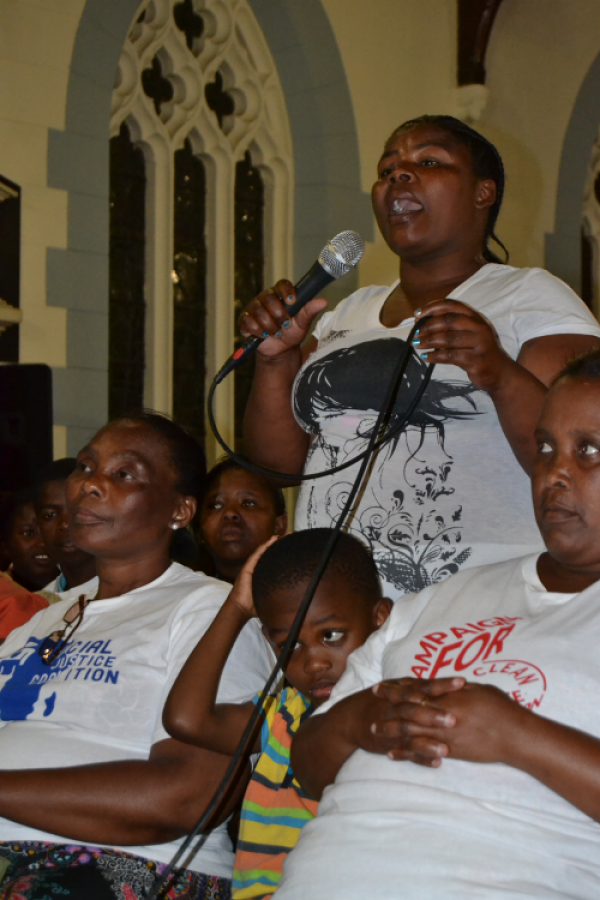

An audience member speaks at the first 2013 Irene Grootboom lecture. Photo by Zola Valashiya..
13 November 2013
The Khayelitsha based Social Justice Coalition launched the 6th Irene Grootboom Dialogue Series last night with a seminar on the History of Insecurity in South Africa.
The dialogue series celebrates the memory and struggle of the admired community activist Irene Grootboom. Irene’s name became popular when she and her co-applicants – 390 adults and 510 children – took the South African government to the Constitutional Court for failure to provide adequate housing in their Cape Town informal settlement of Wallacedene.
The Grootboom case has been successfully used as a precedent to fight for many other socio-economic rights that are outlined in South Africa’s Constitution.
“Each year the Grootboom dialogue series aims to address an issue that is topical. We saw it fit to explore the idea of safety and security in South Africa. The series asks: What does it mean to be safe in Cape Town? How do the lived experiences of particularly poor and working class people differ to those of their privileged counterparts,” says Joel Bregman of the Social Justice Coalition.
The dialogue series comes at a time of public outcry over police brutality, the performance of the South African Police Service (SAPS) and levels of safety and security in South African communities. Speaking at the seminar, Sean Tait (Director of the African Policing Civilian Oversight Forum), remarked that the history of policing in South Africa is rooted in sectarian and political interests, often prejudicing the most vulnerable. Tait gave an extensive account on the police reform programme developed during South Africa’s transition and the effects it has on the current status of the SAPS.
“We have one of the largest police forces in the world, yet this still does not translate in people being safe. Through the years, the notion of heavy-handedness and the militarization of the police has lead to the torture of many civilians,” says Tait.
Commenting on the present status of the police, Tait said that a more integrated approach is needed when dealing with the essential need for safety and security. Tait noted that community participation through policing forums and street committees will help counter the dominance of the police and foster a culture of responsibility.
Tait also commented that large paramilitary operations, which are carried out as part of the National Crime Combatant Strategy, often result in the xenophobic profiling of immigrants.
SJC secretariat member and activist Zackie Achmat gave an account on how the history of inequality is related to the fight for equality and social justice.
“The history of insecurity in South Africa is also a history of inequality and injustice. That is why the struggle for safety and dignity for all is so important. What happened to Andries Tatane, Mido Macia and the miners at Marikana is proof that we need to not only change our policing system but our society as well,” said Achmat.
In his address, Achmat explored the history of incarceration and persecution by the apartheid regime. “The primary motive of the police under apartheid was not to maintain law and order. It was to ensure that black working class South Africans remained subjugated.”
“Amapolisa ase Mzantsi Afrika awa sebenzi. Senga’ ncedakala njani? [Our police in South Africa are inefficient. How do we solve this?]” remarked an audience member during the dialogue session.
Isaac Mbadu, an activist involved with the SJC, said: “Our leaders are in denial. Safety and security are primary concerns for us living in the township. Yet, the authorities tell us that everything is under control.”
Closing off the dialogue, Tait argued that concerns around crime are often usurped by the privileged. “Tactical responses have been developed for three crimes — house robberies, hijackings and business robberies – yet evidence shows that the real concerns are day-to-day crimes that affect poor and working class people.”
On 13 November, the Khayelitsha Commission of Inquiry into policing will hold it’s 1st preliminary hearing at Lookout Hill, 10am in Khayelitsha.
The SJC Irene Grootboom Dialogue series will run until the 23rd of November. Download the programme here.